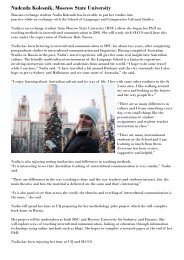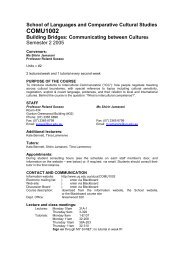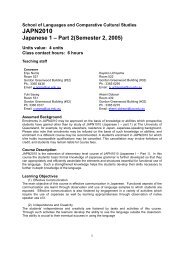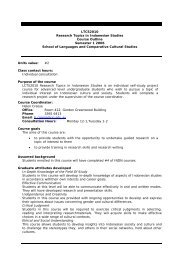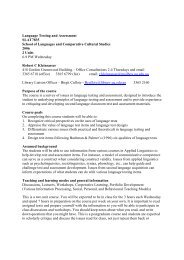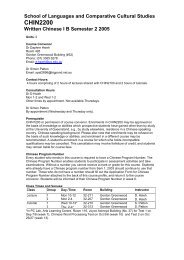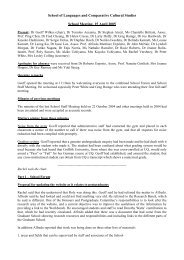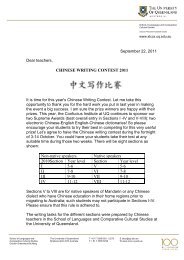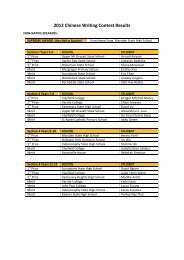Course Outline - 2006 - School of Languages & Comparative ...
Course Outline - 2006 - School of Languages & Comparative ...
Course Outline - 2006 - School of Languages & Comparative ...
Create successful ePaper yourself
Turn your PDF publications into a flip-book with our unique Google optimized e-Paper software.
THE UNIVERSITY OF QUEENSLAND<br />
SCHOOL OF LANGUAGES AND COMPARATIVE CULTURAL STUDIES<br />
<strong>Course</strong> <strong>Outline</strong> - <strong>2006</strong><br />
CHIN2340: Classical Chinese in Confucian Classics<br />
Units value 2<br />
Class contact hours 2<br />
PURPOSE OF THE COURSE<br />
Students will learn the basics <strong>of</strong> classical Chinese through the Confucian classic Lun yu (The Analects).<br />
Students will also learn the historical background and philosophy <strong>of</strong> Confucius and Confucianism which<br />
can lead to the preparation <strong>of</strong> their honours or postgraduate research in many different areas.<br />
STAFF:<br />
LECTURER AND CONVENOR<br />
Dr Chiu-yee Cheung, 411 Greenwood Bldg. Ph: 33656557 (voice mail)<br />
E-mail: c.cheung@uq.edu.au<br />
Consultation hours: Mon: 13:00-16:00<br />
Research day (not available): Tuesday<br />
CLASS HOURS & LOCATIONS:<br />
LECTURE<br />
Thur, 10:00-12:00, 39A-203 (General Purpose North 3)<br />
COURSE GOALS<br />
On completing this course students should:<br />
-- be able to read basic classical Chinese text;<br />
-- understand the basic classical Chinese vocabulary, expressions, and sentence patterns;<br />
-- have a clear understanding <strong>of</strong> Confucius and Confucianism, one <strong>of</strong> the three main pillars <strong>of</strong> Chinese<br />
thought<br />
GRADUATE ATTRIBUTES DEVELOPED<br />
In-Depth Knowledge <strong>of</strong> the Field Of Study<br />
This subject is an introduction to Confucius and his major work The Analects. The subject covers indepth<br />
knowledge about Confucius’s life, his time, the major ideas <strong>of</strong> the The Analects, and their influence<br />
in Asia. Through The Analects, students learn about classical Chinese language.
Effective Communication<br />
Students will learn typical vocabulary and sentence patterns in classical Chinese. The subject highlights<br />
the influence <strong>of</strong> classical Chinese on modern written and spoken Chinese and will enable students to<br />
communicate more effectively on a higher level.<br />
Independence and Creativity<br />
Students will be given opportunities in their assignment to apply Confucian principles to certain<br />
contemporary scenario.<br />
Critical Judgment<br />
Students will discuss the relevance <strong>of</strong> Confucianism to the contemporary world and issues about the<br />
“creative transformation” <strong>of</strong> Confucianism in the class and in their assignments.<br />
Ethical and Social Understanding<br />
Confucianism is one <strong>of</strong> the major roots <strong>of</strong> Chinese civilisation. Through it, students will learn about the<br />
Chinese mind, values, culture, and society, and their differences to the West. Through comparison <strong>of</strong><br />
classical and modern Chinese, students will also learn the cultural and social changes in China.<br />
ASSUMED BACKGROUND<br />
This subject is designed for native and background speakers <strong>of</strong> Chinese, and students who have finished<br />
second year written Chinese or above.<br />
TEACHING AND LEARNING MODES<br />
There are 2 lecture hours per week. In class the lecturer will introduce the life and works <strong>of</strong> Confucius,<br />
the basic ideas and a brief history <strong>of</strong> Confucianism, common vacabulary, expressions, and grammar<br />
structures <strong>of</strong> classical Chinese. There will be discussions in class. Students will develop their own<br />
opinion about Confucianism in small groups and present their idea in class. Students are encouraged to<br />
use internet recourses for their assignments.<br />
ESSENTIAL TEXTS AND REFERENCES:<br />
There is no textbook. Some handouts will be supplied by the lecturer. You should download a copy <strong>of</strong><br />
Lun yu in traditional characters and a copy <strong>of</strong> English translation <strong>of</strong> Lun yu from the Web. The best<br />
WWW sites <strong>of</strong> relevant internet resources are listed on my web page:<br />
http://ww.uq.edu.au/~jaccheun/Zhongguo.html<br />
Copies <strong>of</strong> recommended English translations <strong>of</strong> Lun yu are also available in high use area in SS&H<br />
library.
RESOURCES AVAILABLE AND REQUIRED<br />
Library and IT facilities are available in the SS&H library and the ALC (Joyce Ackroyd Bldg, Bldg 37).<br />
Specific help with library materials is available from the Asian studies librarian, Ms Wai Wai Lui, in<br />
SS&H library. Just ask at the Information Desk.<br />
ASSESSMENT PROGRAM, OUTCOMES & GRADING<br />
You will be assessed on<br />
Your knowledge <strong>of</strong> the life and historical background <strong>of</strong> Confucius and Confucianism;<br />
Your knowledge <strong>of</strong> the bacis ideas <strong>of</strong> Confucianism;<br />
Your knowledge <strong>of</strong> some very famous quotations <strong>of</strong> Confucius;<br />
Your ability to read classical Chinese;<br />
Your ability to analyse the sentence structure <strong>of</strong> classical Chinese;<br />
Your ability to know the simplified version <strong>of</strong> some common traditional characters<br />
TYPE OF ASSESSMENT:<br />
2 short tests: The first test will focus on classical Chinese grammar, sentence structure, and vocabulary.<br />
The second test will be about Confucianism.<br />
Class participation: it includes attendance and your notes. You will need an exercise book <strong>of</strong> 90+ pages<br />
for taking notes in the class and/or reading relevant literature. It will be read by the lecturer from time to<br />
time during the semester.<br />
ASSESSMENT:<br />
2 test: 50% Final examination 40% Class Participation: 10%<br />
GRADE DESCRIPTORS<br />
7 The student demonstrates a clear understanding <strong>of</strong> the vocabulary, terminology, and sentence structure <strong>of</strong><br />
Lun yu. The student remembers some <strong>of</strong> the most famous lines <strong>of</strong> Lun yu and is able to give a generally accepted<br />
interpretation in English. The student has a comprehensive knowledge <strong>of</strong> the major arguments and issues about Lun<br />
yu and its author. The student understands the meanings <strong>of</strong> the common traditional characters in the text and able to<br />
convert them into simplified characters.<br />
6 The student understands most <strong>of</strong> the vocabulary, terminology, and sentence structure <strong>of</strong> Lun yu. The<br />
student remembers some <strong>of</strong> the most famous lines <strong>of</strong> Lun yu and is able to give a generally accepted interpretation in<br />
English with minor mistakes. The student has a good knowledge <strong>of</strong> the major arguments and issues about Lun yu and<br />
its author. The student understands the meanings <strong>of</strong> the common traditional characters in the text and able to convert<br />
most <strong>of</strong> them into simplified characters.<br />
5 The student understands the major vocabulary, terminology, and sentence structure <strong>of</strong> Lun yu. The student<br />
remembers some <strong>of</strong> the most famous lines <strong>of</strong> Lun yu and is able to give an interpretation in English with some minor<br />
mistakes. The student has an acceptable knowledge <strong>of</strong> the major arguments and issues about Lun yu and its author.<br />
The student understands the meanings <strong>of</strong> most <strong>of</strong> the common traditional characters in the text and able to convert<br />
most <strong>of</strong> them into simplified characters.<br />
4 The student understands some <strong>of</strong> vocabulary, terminology, and sentence structure <strong>of</strong> Lun yu. The student<br />
remembers some famous lines <strong>of</strong> Lun yu and is able to give an interpretation in English with some major mistakes.<br />
The student knows a few major arguments and issues about Lun yu and its author. The student understands the<br />
meanings <strong>of</strong> some <strong>of</strong> the common traditional characters in the text and able to convert some <strong>of</strong> them into simplified<br />
characters.
3 The student shows a limited knowledge about Lun yu and the text. The student only remembers a few lines<br />
<strong>of</strong> the text and gives English with many mistakes. The student understands only a few <strong>of</strong> the common traditional<br />
characters in the text.<br />
2 The student does not complete all assessment requirements and is absent from classes for a long period <strong>of</strong><br />
time and shows virtually no knowledge about Lun yu and the text.<br />
1 The student does not complete any assessment requirements and is absent from classes.<br />
NOTE: The University <strong>of</strong> Queensland adopted the “criterion based” assessment principles. That means<br />
that the grade that you obtain is based on your performance in the above assessment instruments. The 7-<br />
point scale will roughly apply to the following pattern:<br />
7 90-100%<br />
6 80-89%<br />
5 65-79%<br />
4 50-64%<br />
3 40-49%<br />
ASSESSMENT POLICIES<br />
• Plagiarism: University rules regarding plagiarism must be observed. If you are unsure about these rules,<br />
please look them up (see<br />
http://www.uq.edu.au/hupp/contents/view.asp?s1=3&s2=40&s3=12) or ask. The onus is on you to<br />
observe them<br />
• Please take note <strong>of</strong> the date, time and place <strong>of</strong> your exam. If you are sick on the day <strong>of</strong> an exam, contact<br />
the lecturer or leave a message the very same day. Makeup exams will not be given to students without a<br />
medical certificate signed by a medical practitioner<br />
ASSESSMENT AND DISABILITY<br />
Assessment variation is possible for students with a disability (see<br />
http://www.uq.edu.au/hupp/contents/view.asp?s1=3&s2=30&s3=3)<br />
SUPPORT FOR STUDENTS WITH A DISABILITY<br />
Any student with a disability who may require alternative academic arrangements in the course/program is encouraged to seek<br />
advice at the commencement <strong>of</strong> the semester from a Disability Adviser at Student Support Services.<br />
STUDENT REPRESENTATIVES<br />
The Teaching and Learning Committee provides advice and recommendations to the Head <strong>of</strong> <strong>School</strong> and <strong>School</strong> Executive<br />
Committee for the development and maintenance <strong>of</strong> strategies for excellence in all aspects <strong>of</strong> teaching and learning in the <strong>School</strong>.<br />
The committee consists <strong>of</strong> academic and general staff representatives as well as undergraduate and postgraduate student<br />
representation. There are 4 elected student representatives on TLC: one from first year students, one from advanced undergraduate<br />
students, 1 from Honours students and 1 from coursework postgraduate students. Students interested in serving on this committee<br />
should consult the chair <strong>of</strong> TLC Dr Guy Ramsay, or the committee secretary Ms Carmen McNaught.<br />
USE OF DICTIONARIES IN EXAMINATIONS<br />
Dictionaries are NOT allowed in the examinations.<br />
COPURSE SCHEDULE
Week Dates Content<br />
1 2/3 Introduction: Confucius and his time<br />
2 9/3 Introduction: Confucianism<br />
3 16/3 Confucius on Himself<br />
4 23/3 On the Way and Mandate <strong>of</strong> Heaven<br />
5 30/3 Rites, Rituals, and Politics<br />
6 6/4 Test 1<br />
7 13/4 On Benevolence 1<br />
20/4 Term break<br />
8 27/4 On Benevolence 2; Test 1 feedback<br />
9 4/5 Labour Day.<br />
10 11/5 On filial piety and sincerity<br />
11 18/5 Test 2<br />
12 25/5 On junzi<br />
13 1/6 The Confucian Legacy and Its Future; Test 2 feedback<br />
FINAL EXAMINATION DURING EXAMINATION PERIOD


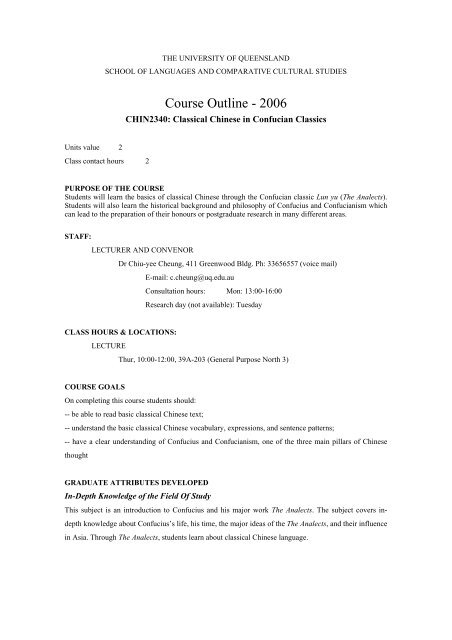
![[first_name] [last_name] - School of Languages & Comparative ...](https://img.yumpu.com/50270271/1/184x260/first-name-last-name-school-of-languages-comparative-.jpg?quality=85)
